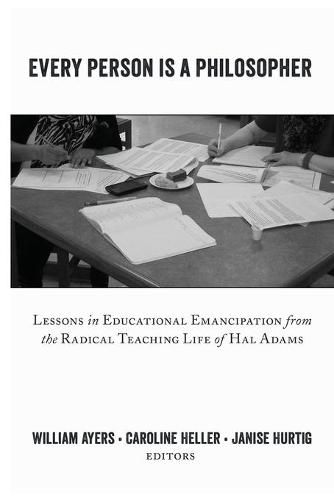Readings Newsletter
Become a Readings Member to make your shopping experience even easier.
Sign in or sign up for free!
You’re not far away from qualifying for FREE standard shipping within Australia
You’ve qualified for FREE standard shipping within Australia
The cart is loading…






This title is printed to order. This book may have been self-published. If so, we cannot guarantee the quality of the content. In the main most books will have gone through the editing process however some may not. We therefore suggest that you be aware of this before ordering this book. If in doubt check either the author or publisher’s details as we are unable to accept any returns unless they are faulty. Please contact us if you have any questions.
Hal Adams was a legendary radical educator who organized writing workshops with people who had been written off during much of their lives, marginalized for reasons of race, gender, class, and caste. Hal detested the carelessness and neglect his students endured and set about building spaces of respect and reparation. Fostering communities of local writers and publishing their work in journals of ordinary thought, the work brought pride and dignity to the authors, carrying the wisdom of their narratives into and beyond their communities. In the traditions of Paulo Freire, Antonio Gramsci, and C.L.R. James, Hal based his approach on the conviction that every person is a philosopher, artist, and storyteller, and that only the insights and imaginings of the oppressed can sow seeds of authentic social change. Every Person Is a Philosopher gathers essays by classroom and community educators deeply influenced by Hal’s educational work and vision, and several essays by Hal Adams. They explore diverse ways this humanizing pedagogy can be applied in a wide range of contexts, and consider its potential to transform students and teachers alike. This is an ideal text for courses in educational foundations, multicultural education, urban studies, sociology of education, English education, social justice education, literacy education, socio-cultural contexts of teaching, adult education, cultural studies, schools and communities, and popular education.
$9.00 standard shipping within Australia
FREE standard shipping within Australia for orders over $100.00
Express & International shipping calculated at checkout
This title is printed to order. This book may have been self-published. If so, we cannot guarantee the quality of the content. In the main most books will have gone through the editing process however some may not. We therefore suggest that you be aware of this before ordering this book. If in doubt check either the author or publisher’s details as we are unable to accept any returns unless they are faulty. Please contact us if you have any questions.
Hal Adams was a legendary radical educator who organized writing workshops with people who had been written off during much of their lives, marginalized for reasons of race, gender, class, and caste. Hal detested the carelessness and neglect his students endured and set about building spaces of respect and reparation. Fostering communities of local writers and publishing their work in journals of ordinary thought, the work brought pride and dignity to the authors, carrying the wisdom of their narratives into and beyond their communities. In the traditions of Paulo Freire, Antonio Gramsci, and C.L.R. James, Hal based his approach on the conviction that every person is a philosopher, artist, and storyteller, and that only the insights and imaginings of the oppressed can sow seeds of authentic social change. Every Person Is a Philosopher gathers essays by classroom and community educators deeply influenced by Hal’s educational work and vision, and several essays by Hal Adams. They explore diverse ways this humanizing pedagogy can be applied in a wide range of contexts, and consider its potential to transform students and teachers alike. This is an ideal text for courses in educational foundations, multicultural education, urban studies, sociology of education, English education, social justice education, literacy education, socio-cultural contexts of teaching, adult education, cultural studies, schools and communities, and popular education.